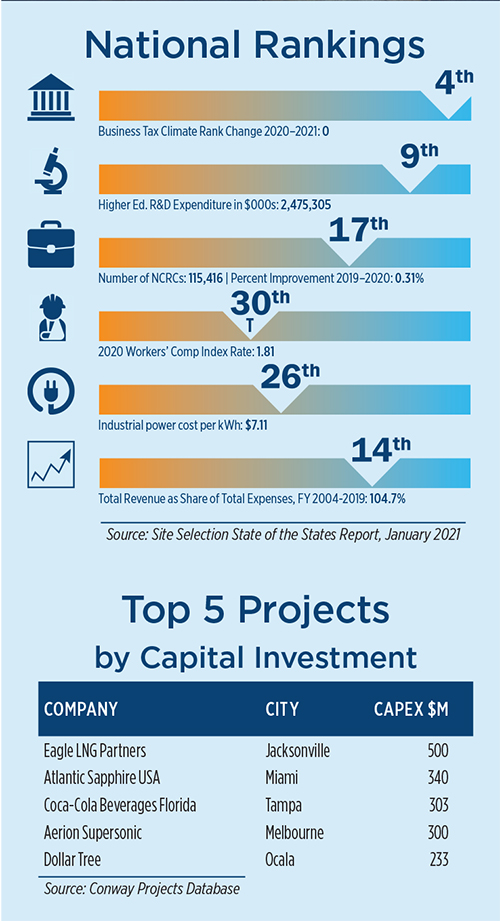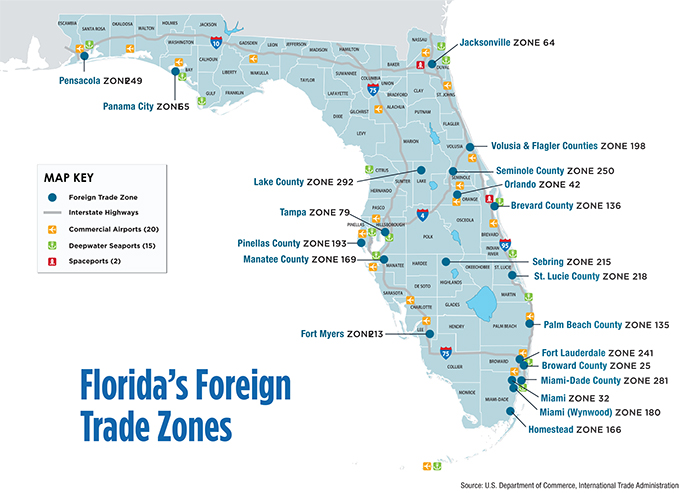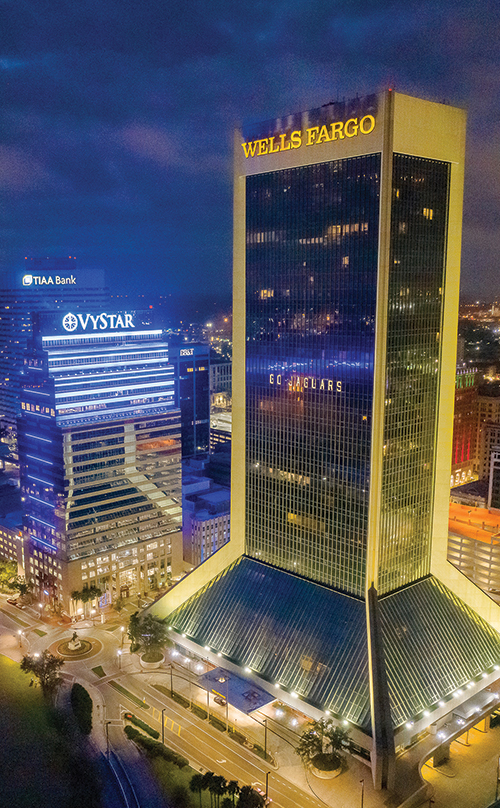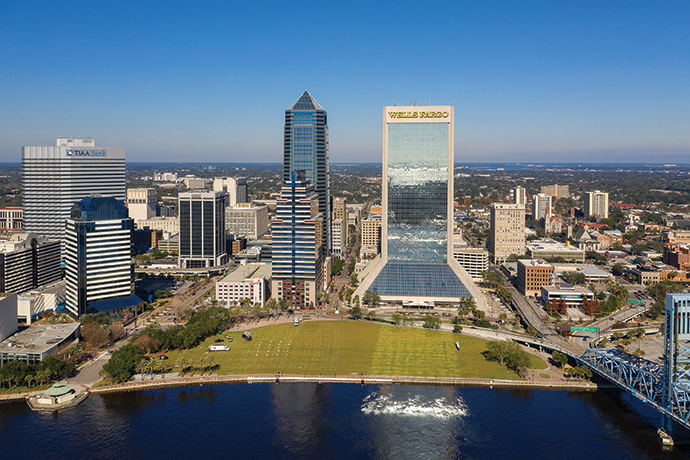Even before the global pandemic, people and companies were moving to Florida in droves. From Wall Street firms making a beeline to Tampa Bay to med-tech companies setting up shop in Greater Orlando, the Sunshine State had a welcome mat larger than any other.
Then came 2020, and something happened to that pace of relocation. It accelerated. What was already a steady stream turned into a gushing waterfall. The gravitational pull of sun, sand, warmth, low taxes, pro-business climate and highly educated talent became too much for many employers to resist.
If you want to know why so many high-growth firms are fleeing the Northeast, Midwest and West Coast to open shop in Florida, talk to the people making these moves. People like Texas billionaire Robert Bass, who founded Aerion Corp. in 2003 to commercialize supersonic flight.

Aerion started working on developing supersonic business jets in 2004. By 2020, the company had grown to a point where a new home made sense for multiple reasons. On December 10, Aerion announced it had commenced work on a new $300 million, 2-million-sq.-ft. headquarters complex at Orlando Melbourne International Airport on Florida’s Space Coast. The 110-acre campus, called Aerion Park, will be home to research, design, production and interior completion of the firm’s AS2 supersonic business jet.
Production of the Mach 1.4 AS2 is scheduled to start in 2023, with initial flight of the aircraft slated for 2025 and delivery to customers in 2027. Columbus, Ohio-based NetJets recently ordered 20 of the AS2 supersonic jets, and the backlog of orders for the aircraft now stands at $11 billion.
The company chose to relocate its headquarters from Reno, Nevada, to Florida for multiple reasons, says Tom Vice, chairman, president and CEO of Aerion. “The considerable aerospace legacy in the state of Florida and the existing talent pool in engineering and manufacturing offered a major attraction to our company as we look to add around 675 new jobs ahead of production of the AS2 starting in 2023,” Vice says. “We also selected the state of Florida and the City of Melbourne due to the excellent educational system, the right business climate with global access, the unique attributes of the Orlando Melbourne International Airport, and the growing cluster of aerospace and innovative aviation technology companies that populate the region.”
Vice says that Aerion considered other locations across the country for its future home, “and Melbourne emerged as the clear choice. The Space Coast is home to some of the most innovative minds on the planet. At Aerion, we are a team of passionate entrepreneurs, collaborative innovators and courageous creative engineers, bonded by unwavering integrity, and driven to build the next generation of global transportation networks — networks that significantly reduce the time and friction of travel while leaving no carbon footprint behind — and I know we will find many like-minded future co-workers here.”

Vice adds that “we will transition progressively from our current Reno headquarters to Melbourne over the next two years. We will maintain a presence in Palo Alto, California, with Aerion Technologies.”
Incentives were not the decisive factor in the deal, but Vice notes that they helped seal it. “We are enthused by the sense of partnership expressed by the state of Florida, Brevard County and the local Melbourne community and their shared passion for our mission,” he says. “As a privately owned company we do not disclose the details of our contracts, but as detailed in an announcement, Space Florida made a multi-million-dollar investment in our company.”
New Bill is a ‘Lifeline to Small Businesses’
Aerion was the fourth-largest capital investment in Florida in 2020. The only bigger deals came from Eagle LNG Partner in Jacksonville ($500 million), Atlantic Sapphire USA in Miami ($340 million), and Coca-Cola Beverages Florida in Tampa ($303 million).
Site selection consultant and corporate headquarters relocation expert John H. Boyd of The Boyd Company Inc. says that a new sales tax bill signed into law by Florida Gov. Ron DeSantis should make the Sunshine State even more attractive to many companies.
“Relief from Florida’s commercial rent tax and the impending spike in unemployment insurance could not come at a better time,” says Boyd. “Passage of SB-50 is a lifeline to thousands of the state’s small businesses, many in the hospitality sector, reeling from the consequences of the pandemic. Several of our clients with major office operations in Florida have long lobbied for relief from the onerous 5.5% rent tax, the only such tax in the nation.”

Boyd also applauds Gov. DeSantis for the way he handled the pandemic. “Florida has been on point to avoid the type of lockdowns and fiscal calamity that other states have suffered due to COVID,” Boyd says. “I will add that Florida’s positive business climate and how it has dealt with the pandemic, including its latest move on tort reform to protect businesses from frivolous lawsuits due to COVID, has made it a magnet for job creators, wealth and corporate investment of all types, including our site selection firm, now with operations in Boca Raton.”
“We are seeing high demand for cold storage facilities, logistics centers and data centers. Financial services and commercial aerospace firms are also investing heavily in Florida.”
The commercial rent tax has long been one of the few business climate negatives for the Sunshine State, he adds. “Cutting the tax by more than half to 2% is significant and should further help the state in its business attraction efforts, especially as it targets more head office operations. Keep in mind, the Florida legislature recently eliminated its successful QTI incentives program — and the appetite in Tallahassee has not been too keen on tax breaks for businesses, especially in a budget cycle impacted by COVID. So, SB-50 is a welcomed piece of legislation by Florida’s business community, both large and small.”

Crystal Stiles, senior director of economic development for Florida Power & Light Company, says that her team is doing “seven or eight projects around the state now. We’ve redesigned and refreshed our website and data portal to make communities around Florida even more competitive for jobs and industry.”
The site, www.poweringflorida.com, is used regularly by communities and site consultants alike to glean valuable location data and narrow an otherwise complicated site search.
“During COVID-19, we added virtual site tours,” says Stiles. “We will have 30 of those by the end of this year.”
Stiles notes that several product types are quite active now. “We are seeing high demand for cold storage facilities, logistics centers and data centers. Financial services and commercial aerospace firms are also investing heavily in Florida,” she says. “Stalwarts of the finance sector are talking about leaving New York and moving to Florida. In the space industry, Jeff Bezos’ Blue Origin starts launching here next year. Florida is now doing multiple space launches a week.”
I-4 Corridor Getting Even Hotter
J.P. DuBuque, president and CEO of the St. Petersburg Area Economic Development Corp., says that CrossBorder Solutions is a prime example of the current relocation wave. “They are moving from New York to St. Pete,” he says. “They use artificial intelligence for tax solutions. They have a SIRI-like app they call Fiona. Data analytics, cybersecurity and AI are all strong here. Technology is leading the way on companies moving to St. Pete and the Tampa Bay Area.”
CrossBorder Solutions announced March 29 that it will place its new headquarters in St. Pete and hire 300 new employees over the next 12 months. “Our decision to relocate our corporate headquarters represents a significant milestone for our fast-growing company,” said Don Scherer, CEO of CrossBorder Solutions. “Despite the challenges brought on by COVID-19, we felt it was imperative to bring together our growing sales and software development teams in a truly meaningful and collaborative way. The move enables us to continue to provide industry-leading solutions and products to our clients, while also hiring additional talent that will further drive innovation.”
DuBuque adds that “Florida is hot right now. It is incumbent on us to take advantage of that to enhance our communities. We are really trying to build a community.”
Not being left behind is the interior of Florida. About an hour to the east of St. Pete, across the bridge and down Interstate 4, is Lakeland, where the Lakeland Linder International Airport generated an economic impact of $1.5 billion in 2020. That marked a 160% increase from 2019.
According to the folks at LALToday, the sharp increase can be attributed to several major capital investments and expansions, including those of Amazon, NOAA and Draken International. Since 2019, Amazon has announced 1,100 employees at the airport, while Draken has announced 300, NOAA has added 108, and Lakeland-based Publix has hired 582.
The future looks bright for Florida too. According to WalletHub, Florida is now home to three of the Top 20 Small Cities to Start a Business: Fort Myers; South Bradenton; and East Lake-Orient Park.

